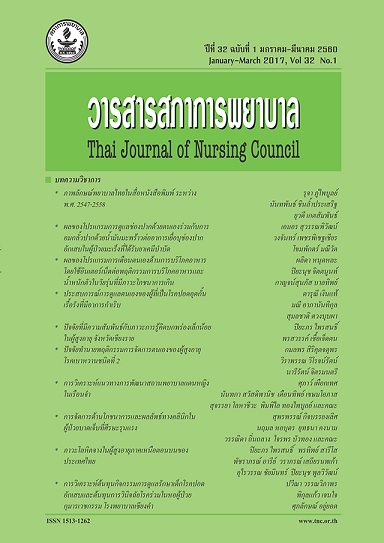ผลของโปรแกรมการเตือนตนเองด้านการบริโภคอาหารโดยใช้อินเตอร์เน็ตต่อพฤติกรรมการบริโภคอาหารและน้ำหนักตัวในวัยรุ่นที่มีภาวะโภชนาการเกิน;Effect of Internet-Based Dietary Self-Monitoring Program on Dietary Behavior and Body Weight Among Overnutrition Adolescents
Keywords:
โปรแกรมการเตือนตนเอง, อินเตอร์เน็ต, พฤติกรรมการบริโภค, น้ำหนักตัว, ภาวะโภชนาการเกิน, วัยรุ่น, self-reminding programme, internet-mediated, overnutrition, adolescentAbstract
วัตถุประสงค์ของการวิจัย: เพื่อศึกษาผลของโปรแกรมการเตือนตนเองด้านการบริโภคอาหาร
โดยใช้อินเตอร์เน็ตต่อพฤติกรรมการบริโภคอาหารและน้ำหนักตัวในวัยรุ่นที่มีภาวะโภชนาการเกิน
การออกแบบวิจัย: การวิจัยกึ่งทดลอง
การดำเนินการวิจัย: คัดเลือกกลุ่มตัวอย่างจากโรงเรียนมัธยมที่มีขนาดใหญ่พิเศษในเขตเทศบาลนครแห่งหนึ่ง จำนวน 2 โรงเรียน โดยใช้วิธีสุ่มอย่างง่าย คัดเลือกกลุ่มตัวอย่างนักเรียนวัยรุ่นที่มีภาวะโภชนาการเกินของแต่ละโรงเรียนแบบเฉพาะเจาะจงตามคุณสมบัติที่กำหนด และจับคู่กลุ่มตัวอย่างทั้งกลุ่มทดลองและกลุ่มควบคุมตามระดับภาวะโภชนาการ กลุ่มละ 24 คน กลุ่มทดลองได้รับโปรแกรมการเตือนตนเองด้านการบริโภคอาหารโดยใช้อินเตอร์เน็ต เป็นระยะเวลา 8 สัปดาห์ กลุ่มควบคุมไม่ได้รับโปรแกรมดังกล่าว เครื่องมือที่ใช้ในการวิจัยประกอบด้วย 1) เครื่องมือที่ใช้ในการทดลอง ได้แก่ โปรแกรมการเตือนตนเองด้านการบริโภคอาหารโดยใช้อินเตอร์เน็ต 2) เครื่องมือที่ใช้ในการเก็บรวบรวมข้อมูล ได้แก่ แบบสอบถามข้อมูลทั่วไป แบบสอบถามพฤติกรรมการบริโภคอาหาร และเครื่องชั่งน้ำหนักแบบดิจิตอล เครื่องมือทั้งหมดผ่านการตรวจสอบความตรงเชิงเนื้อหาโดยผู้ทรงคุณวุฒิจำนวน 3 ท่าน แบบสอบถามพฤติกรรมการบริโภคอาหารผ่านการตรวจสอบความเที่ยงในกลุ่มตัวอย่างจำนวน 20 ราย ได้ค่าสัมประสิทธิแอลฟ่าของครอนบาคเท่ากับ .80 และเครื่องชั่งน้ำหนักตรวจสอบความเที่ยงโดยการเปรียบเทียบกับเครื่องมือมาตรฐานก่อนการชั่งทุกครั้ง วิเคราะห์ข้อมูลส่วนบุคคลโดยสถิติบรรยาย วิเคราะห์ความแตกต่างของคะแนนเฉลี่ยพฤติกรรมการบริโภคอาหารและน้ำหนักตัวภายในกลุ่มก่อนและหลังการเข้าร่วมโปรแกรมโดยสถิติทีคู่ วิเคราะห์ความแตกต่างของคะแนนเฉลี่ยพฤติกรรมการบริโภคอาหารและน้ำหนักตัวระหว่างกลุ่มทดลองและกลุ่มควบคุมโดยสถิติที
ผลการวิจัย: กลุ่มทดลองมีคะแนนเฉลี่ยพฤติกรรมการบริโภคอาหารหลังการทดลองสูงกว่า
ก่อนทดลองอย่างมีนัยสำคัญทางสถิติ (p<.05) และนำ้หนักตัวตำ่กว่าก่อนทดลองอย่างมีนัยสำคัญทางสถิติ
(p<.01) กลุ่มทดลองมีคะแนนเฉลี่ยพฤติกรรมการบริโภคอาหารหลังการทดลองสูงกว่ากลุ่มควบคุมอย่างมี
นัยสำคัญทางสถิติ (p<.01) และนำ้หนักตัวกลุ่มทดลองหลังการทดลองตำ่กว่ากลุ่มควบคุมอย่างมีนัยสำคัญ
ทางสถิติ (p<.05)
สรุปผลการวิจัย: ผลการศึกษาชี้ให้เห็นว่า โปรแกรมการเตือนตนเองด้านการบริโภคอาหาร
โดยใช้อินเตอร์เน็ต สามารถทำให้วัยรุ่นในโรงเรียนที่มีภาวะโภชนาการเกินเปลี่ยนแปลงพฤติกรรมการ
บริโภคอาหารและทำให้นำ้หนักตัวลดลงได้ ดังนั้นจึงควรนำไปใช้เพื่อจัดการภาวะโภชนาการเกินสำหรับ
วัยรุ่นในระบบการศึกษาหรือปรับใช้กับวัยรุ่นโดยทั่วไป
Objective: To study how an internet-mediated self-reminding programme
against overconsumption affected overnutrition adolescents’ body weight
and consumption behaviour.
Design: Experimental research.
Procedure: This study was conducted on a sample from 2 extra-large
secondary schools in a municipal area. The 2 schools were chosen
using the simple sampling method. From each school, adolescent students
with overnutrition were purposively sampled, paired up according to
their nutrition levels and divided into an experimental group and a
control group, each with 24 members. Only the experimental group
participated in the 8-week internet-mediated self-reminding programme
against overconsumption.
The research instruments consisted of the internet-mediated
overconsumption self-reminding
programme as the experimental instrument, in addition to a set of
data-collecting instruments, which were (i) a general information
questionnaire; (ii) a consumption behaviour questionnaire;and
(iii) a digital weighing scale. Personal information was analysed
using descriptive statistics. The differences in the intra-group consumption
behaviour and body weight averages before and after the experiment
were analysed using a paired t-test. The differences in the consumption
behaviour and body weight averages between the experimental
and control groups were analysed using an independent t-test.
Results: After participating in the programme, the experimental
group achieved a signifcantly higher average score for consumption
behaviour (p < .05) and a signifcantly lower body weight
average (p < .01). On the other hand, after 8 weeks, the
control group, which had not participated in the programme,
showed no signifcant difference in its consumption behaviour
and body weight averages (p > .05), but had a signifcantly
higher body weight average (p < .01). After the
experimental group had completed the programme, the two
groups were compared, and signifcant
differences were found between the experimental group’s
and the control group’s consumption
behaviour and body weight averages, at p < .01 and p < .05,
respectively.
Recommendations: The fndings of this study offer basic information on
caring for elderly type 2 diabetes patients. Based on the study,
it is recommended that such patients be accompanied by their family
members during meals and physical exercise,
as such companionship could enhance the patients’ health-care
behaviour. In addition,the fndings could be applied to further
developing a self-management programme for
elderly type 2 diabetes patients








